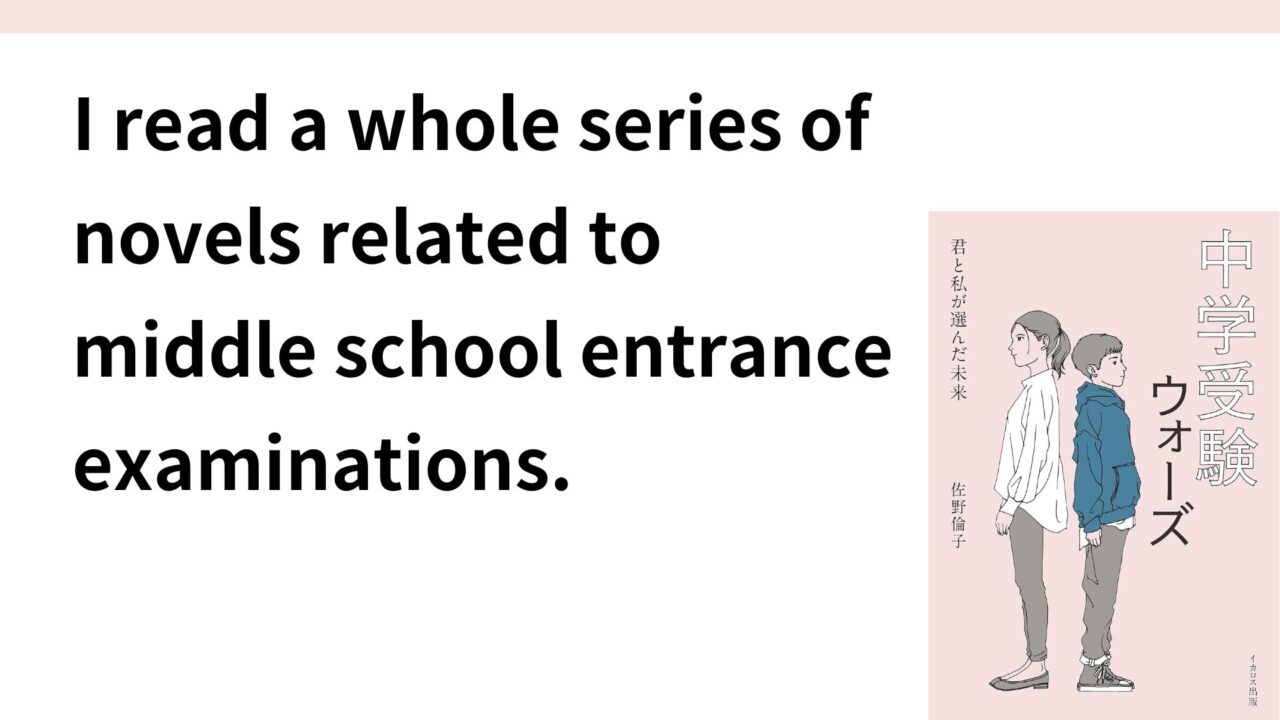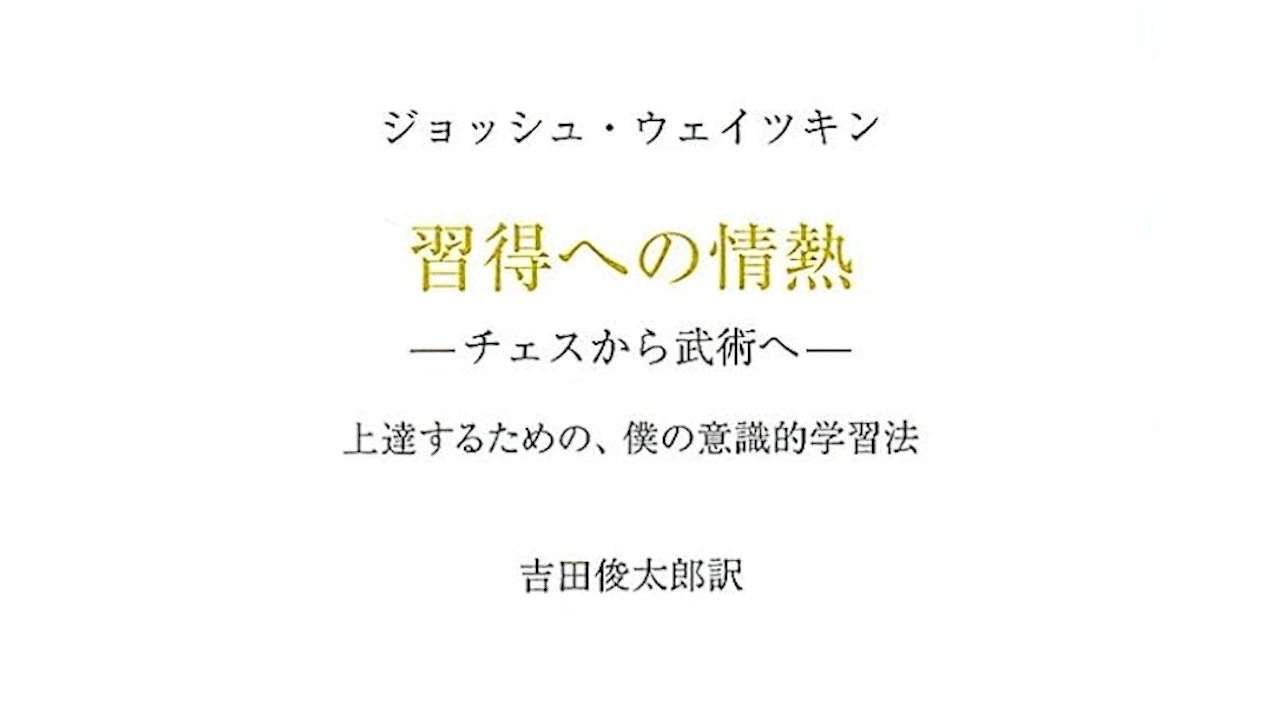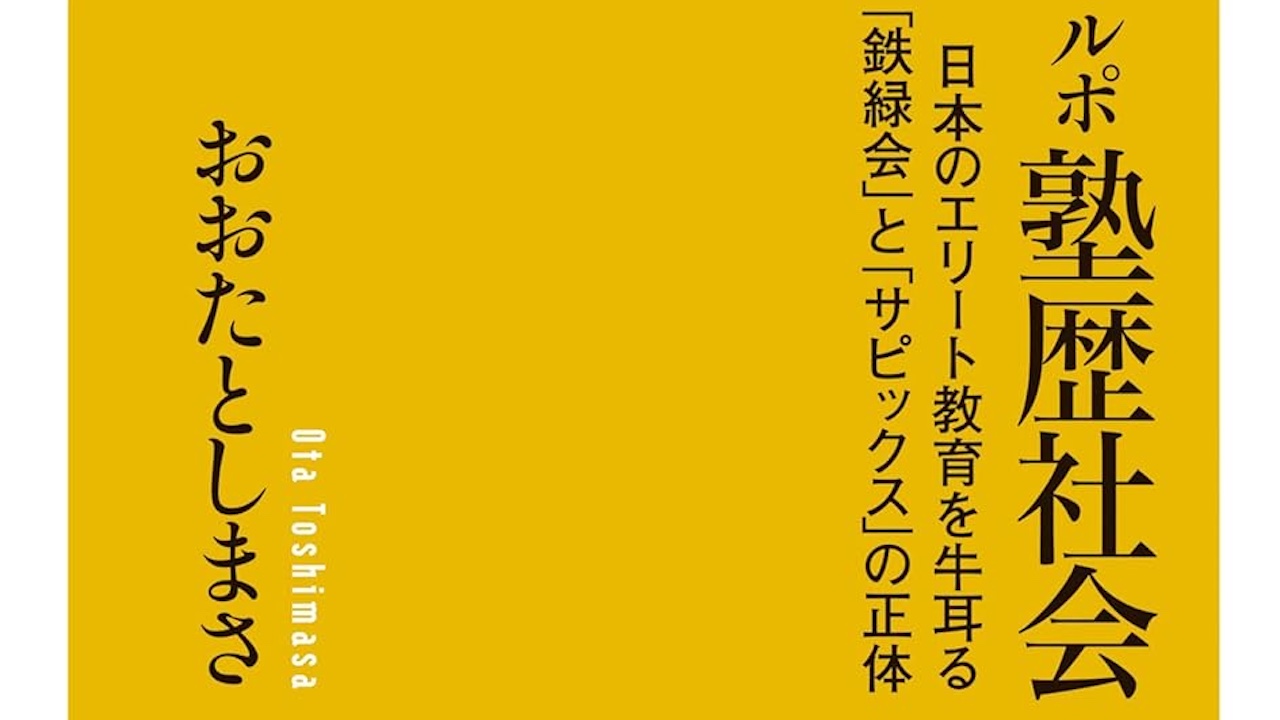- Introduction.
- Jr. High School Entrance Exam Wars: The Future You and I Chose
- If you don’t pass here, you’ll be stuck with Tokyo University and Waseda-Keio for the rest of your life!”
- If you can’t solve it, no one can.”
- Let’s take it one step at a time.”
- It’s testing my gall as a parent…but I’m at my wits’ end!”
- I can’t help it, I’m not very smart on the ground.”
- I thought I had decided to take the exam loosely. But will this really get me in?”
- Parents tend to get stuck in the middle school entrance exam swamp trap.
- Wings of Wings (Asuka Asahina)
- The Brave Men’s Junior High School Entrance Exam
- Ayuta: Although he started off in grade 1 and his parents were well-prepared,
- Hayato: It was even said to be the closest to passing the triple crown (Nada, Kaisei, and Chikkoma), but,
- Kozue: As a result of my reflection on my eldest daughter’s junior high school entrance exam, I treated my second daughter,
- Keikokujyo Keiken: Parents graduated from junior high school, but their daughter still aimed for the most difficult junior high school!
- Read it all at once.
Introduction.
I forget what prompted me to read some fiction/non-fiction when I became interested in middle school about a few months ago, so this is a reminder of what I read.
I read the following five books. And a comic book called “February Winner”. All the books were very realistic and interesting. My impressions are listed for each book.
- Jr. High School Entrance Exam Wars” by Rinko Sano (Author)
- Tsubasa no Tsubasa” by Asuka Asahina (Author)
- The Brave Ones’ Junior High School Entrance Exams: When My Child Became Serious and My Eyes Woke Up” by Ota, Toshimasa (Author)
- The Daughter of a Junior High School Graduate Who Aimed for the Most Difficult Junior High School! Shinichi Sakurai (Author)
- Tengenji Wars” by Rinko Sano (Author)
Jr. High School Entrance Exam Wars: The Future You and I Chose
It describes the stories of six pairs of parents and their children regarding their junior high school entrance examinations.
If you don’t pass here, you’ll be stuck with Tokyo University and Waseda-Keio for the rest of your life!”
A “Sakurain to Tokyo University mother” faced the shock of her child’s inability to study.
The highly educated parents thought that their children could also succeed in the entrance examination for junior high school, as they should, and enrolled their daughters in cram school from the new grade 4, but their children’s deviation values did not rise as expected, and they gradually lowered the deviation values of the schools they wanted to enter, eventually getting into junior high schools that were not so high in terms of deviation values.
After passing the exam, my daughter said, “I’m good at more things than studying. There are people like that! They are not the same type as my mom!” and tells her mother.
If you can’t solve it, no one can.”
He was supposed to have the qualities and environment to aim for the highest level, but he lacked self-discipline and courage, and his test results were not good enough. The mother felt that her son needed to break free from the beliefs that held him back, so she decided to become an actress and told him, “If you can’t solve it, no one can,” when he entered the 6th grade.
Then, his deviation gradually increased from the high 50s, and he was eventually accepted into Azabu.
Let’s take it one step at a time.”
A mother who divorced when her son was young and struggles to work as a CA and raise her child as a single mother. She is unable to take time off until she accompanies her son to study for his junior high school entrance exams. Her son wants to join the baseball team and go to the Koshien (the National High School Baseball Championship), and her first choice is Waseda University. He was not accepted to his first choice for the junior high school entrance exam, but was accepted to his third choice. The child said he would go to Waseda University for the high school entrance examination, and in fact, three years later, he was accepted to Waseda High School.
It’s testing my gall as a parent…but I’m at my wits’ end!”
The mother, who did not have bad memories of the junior high school entrance exam, was conscious of “the process rather than the result” and enrolled her daughter in a major cram school from the new fourth grade, but she became impatient with the fact that her daughter did not commit to even the “process” at all. However, she felt frustrated that her daughter was not even committed to the “process.” Her daughter loved cheerleading and would definitely go to the school three times a week, so she could no longer keep up at the big cram school and switched to a private school midway through the year. After that, she continued to attend both cheerleading and cram school at the same time, and entered the junior high school entrance examination with a deviation score in the low 40s. She was not accepted on the first day of her first choice, Keisen, but tried again on the third day, which was more difficult, and passed.
I can’t help it, I’m not very smart on the ground.”
Mother, who had been implicitly told by her mother-in-law, who had passed her son (husband) to Kaisei Academy, that “grandchildren cannot study as well as their mothers”, was so frustrated that she kept on giving her children early childhood education, early education, Photon Math Club from the early grades, and SAPIC with full marks, and they were in a foie gras state. However, her son’s deviation score was in the mid 40’s without improving, and she heard her mother-in-law telling her husband, “In the end, he will be overtaken by a child with a good grounding.” In the fall of his 5th year, he transferred to Waseda Academy, but was not placed in the Kaisei special training class, and his mother-in-law told him, “Changing cram schools is not an option. She was told by her mother-in-law, “It’s no use changing cram schools.
My son tells me, “Half of me is my mom’s genes, but you didn’t go to college, Mom,” and the mother tells her son, “You can’t help it because you’re not very smart on the ground.
The son responded, “I thought that you were making me study to make me look good. If you are going to study so hard, you should have done it when you were a child, and you should not be told to go to Kaisei without having studied hard yourself. After that, she changed her mind and decided to send her son to a junior high school that really suited him, not based on deviation score, and as a result, he was accepted to Kaijo.
I thought I had decided to take the exam loosely. But will this really get me in?”
Parents and children who have stopped attending school and chose to take junior high school entrance exams to avoid public schools. However, the child is not very enthusiastic about it. The parents get impatient and end up saying harsh things. Then, the parent sees the child copying down the answers, saying that the child is studying, and is shocked to find that she has pushed her daughter into a corner. The instructor in charge told her that the order of deviation score is not the order of the school of choice, and she was able to escape from the deviation score curse and successfully passed the entrance exam to Tamagawa Gakuen.
Parents tend to get stuck in the middle school entrance exam swamp trap.
(1) They have not studied hard themselves, so they try to make up for it by taking their children’s entrance examinations.
(2) They are more concerned than necessary about their cram school class and the deviation score they have.
3) They think of the junior high school entrance examination in terms of cosmetics and typa. If you spend this much money and time, you can’t back out.
(4) They think that since they are excellent, their children will be able to do the same.
Wings of Wings (Asuka Asahina)
Enka, a housewife, grew up with no connection to cram schools or junior high school entrance exams. She entered a women’s college with a recommendation from a designated school, but after having a child, she realized that she was interested in her child’s education. She then had her son, Tsubasa, take a test at a major cram school when he was in the second grade.
As a result, my son’s deviation score in Japanese was 67, a high result for a student who had done nothing to prepare for the test. The instructor was so elated that he started enrolling his son in the cram school. The mother of a student at the same cram school praises Tsubasa-kun, saying, “Tsubasa-kun is very intelligent,” and Enka becomes more and more proud of herself.
However, Tsubasa’s grades drop in the fourth grade, and Enka becomes impatient. Her husband Shinji, who had taken the entrance exam for a famous private integrated junior and senior high school, is dismayed that Tsubasa’s grades have not improved even after sixth grade, and begins to watch Tsubasa’s studies on Enka’s behalf. Why can’t you even do those problems? You ordinary people need to move your hands!” the husband yells at his son, which is tantamount to educational abuse. The son, not wanting to be yelled at by his father, cheats on his cram school confirmation test. When the father finds out, he is upset and says, “You’re finished. With results like these, you won’t get into any schools. I have no choice but to stop him from taking the junior high school entrance exam. It’s a waste of money. I’m going to give up on him.
So Enka finally realizes that she has unknowingly pushed her son into a corner, hears Tsubasa’s true feelings, and decides to stop saying anything to him. She also decides that if Tsubasa speaks to her, she will return the words with love.
Ultimately, Tsubasa was not accepted to his first choice of school, but he was accepted to the same junior high school as his father.
The Brave Men’s Junior High School Entrance Exam
A non-fiction story based on the true stories of three sets of parents and their children, and serious reportage.
Ayuta: Although he started off in grade 1 and his parents were well-prepared,
Neither of his parents had any experience taking junior high school entrance exams, but his father heard about junior high school entrance exams from a senior student at work and thought that the experience of working hard toward a goal would be beneficial for his child. He thought it would be better for his son Ayuta to have as much time as possible to prepare for the junior high school entrance examination. After that, in May of the second grade, he started attending Waseda Academy, which Ayuta seemed to enjoy in the beginning.
However, in the fourth grade, the number of rivals suddenly increased and Ayuta dropped to a lower class. Her father, wishing to change the trend, had her switch to the Topix school, but by the sixth grade, her deviation score had dropped to 40. Despite all the research he could do as a parent and all the resources he could muster, Ayuta’s grades did not improve, and he was forced to gradually lower his school of choice from Eiko Gakuen to Keio Normal School to Asano. Eventually, he was accepted to Chūōdai Yokohama and Kamagaku, and entered Chūdai Yokohama. After taking the junior high school entrance exam, his father felt ashamed of his narrow-mindedness, which ultimately led him to focus only on the results, even though he had made a mental note that the process, not the results, were important.
Hayato: It was even said to be the closest to passing the triple crown (Nada, Kaisei, and Chikkoma), but,
Hayato was called the man who was closest to passing all the “triple crown” (Nada, Kaisei, and Chikkoma) at his cram school. He began attending Waseda Academia in the fourth grade and was exempted from most tuition fees as a special student. It was obvious from an early age that Hayato was different from the other children. He learned all the karuta cards at the age of two and would do all his older brother’s Benesse materials for him.
His mother, too, was enthusiastic about the fact that he was different, and made sure that all homework was solved twice each in order to ensure that the content of the class was perfectly retained. However, she became too enthusiastic, and before long Hayato became a child who would not do without being told. Nevertheless, by the time Hayato was in the 5th grade, he had the students solve Kaisei’s same-day entrance exam on the same day, and he was already good enough to pass the exam.
However, he failed the Nada entrance exam and was not accepted. On the day before the Kaisei entrance exam, a teacher at the cram school said to him, “All my students had passed the Nada exam before, and you’re just rubbing it in my face. That’s why you’re no good.” He suffered a mental breakdown and was rejected from both Kaisei and Chikkoma. He was rejected from both Kaisei and Chikkoma, but he passed the entrance exam for Seikou Gakuen and entered the school, but he became lethargic and out of it safely. His parents divorced.
His mother, feeling the need to repent and make a break with the value system that evaluates people based on deviation scores and test scores, decides to take Hayato to the “Imo Imo” school, which declares that it does not improve school grades and hosts an unconventional private school. Hayato gradually regains himself through outdoor programs and other activities.
Kozue: As a result of my reflection on my eldest daughter’s junior high school entrance exam, I treated my second daughter,
Although her parents had no experience in taking junior high school entrance examinations, they had experienced their eldest daughter Azusa’s entrance examination for junior high school, and based on their reflections on that experience, they discussed with their second daughter Kozue the need for better preparation if she was to take the entrance examination for junior high school as well. Her mother, Sakira, carefully selected a cram school that suited Kozue’s needs, and in February of her fourth year of elementary school, she started attending a group cram school called “Unoki Kyoiku Gakuin. At first it was smooth sailing, but after Kozue’s classes went online due to Korona’s influence, her grades began a gradual decline and her deviation score dropped to around 40. Then, Sakira finally said, “If you don’t want to do it, you can stop taking the junior high school entrance exam!” which is a forbidden word to Kozue.
Later, however, she regretted it and came to believe that it was the role of her parents to find many schools that suited Kozue within her academic ability, not based on the deviation value principle. Then Sakira’s impatience disappeared, and at the same time, the daily life in the house became calm as if it were a lie. Eventually, Kozue is accepted to Furendo, her first choice.
Keikokujyo Keiken: Parents graduated from junior high school, but their daughter still aimed for the most difficult junior high school!
This is a non-fiction story of a father who graduated from junior high school and a daughter with a deviation score of 41 who, without going to any preparatory school, aim to enter Sakurain Junior High School together.
The father entered a local technical high school where he was told that he would definitely pass the exam as long as he took the test, but he questioned the need to stay in high school, quit high school, and subsequently became a working adult and changed jobs numerous times. He dammed up the flow of middle school graduates by himself and began to think that his daughter should take the entrance exam. Then, on September 1 of grade 5, instead of going to a cram school, the father started studying for the entrance exam together with his daughter in the form of a parent school. From the day he started to the day she took the entrance examination, he did not miss a single day of school, missed trips, weddings and funerals, and studied every day from after school until late at night. He never watched TV, never went to the park, and was teased at school for being a fazakon (father’s son) and being ostracized by his peers.
The result was unsuccessful, but she was accepted to another difficult girls’ junior high school.
He made an interesting observation toward the end.
In fact, I felt that my academic ability was growing rapidly. However, I could not reach the most difficult level. It was impossible to secure any more study time. I could not cut down my sleeping hours any further. I think it was not because we had only one year and five months to study, but because even if we had three years, we still would not have reached the most difficult entrance examinations.
Source: “Gekkokujo Jyugyo Keiken: Parents graduated from junior high school, but their daughter still aimed for the most prestigious junior high school! Shinichi Sakurai (Author)
It is not a simple matter of heredity or intelligence, but rather the fact that the most difficult entrance examinations are in places where you can never reach them if you only try to improve your academic ability. Academic ability grows if you study. Certainly, it will grow. However, I did not realize that in order to reach the level of the most difficult level, one must change one’s character as well as one’s academic ability. You might call it “nature.
When you acquire knowledge, you always organize it and store it. We think about when we take it out. It’s not just a matter of cleaning up the mess, but the feeling you have when you store it is your academic ability. A child who is prepared for the feeling of being able to quickly retrieve it will accumulate more and more positive results. The last bastion cannot be crossed without developing “character” and “nature.
It is not as simple as “a meticulous child,” but a child who knows why he/she prepares. They must be accustomed to living a life where input is for output. Without it, they will rely on luck on the day of the event to find knowledge instantly.
The above mentions the task of structuring (chunking) information, and the same is mentioned in other books.
Read it all at once.
I’ll refrain from commenting on the subject of junior high school entrance examinations, as it is a rather sensitive topic.
- There are as many dramas as there are parents and children
- Early education is not the way to go.
- It is easy to get tangled up in the supremacy of deviation.
- Even if you are wiped out in the middle school entrance exam, is it important to reach a situation where you are glad you did?
- Some parents try to make up for their own lack of study by taking their children’s entrance exams, while others enter their children’s junior high school entrance exams, assuming that because they are highly educated and talented, their children will be able to do the same.
Click here for an article on inheritance against school history bias and the heritability of intelligence.





コメント